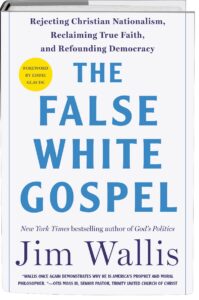 The False White Gospel: Rejecting Christian Nationalism, Reclaiming True Faith, and Refounding Democracy Jim Wallis (St. Martin’s Essentials) $30.00 OUR SALE PRICE = $24.00
The False White Gospel: Rejecting Christian Nationalism, Reclaiming True Faith, and Refounding Democracy Jim Wallis (St. Martin’s Essentials) $30.00 OUR SALE PRICE = $24.00
I can hardly say how much I loved this book, how much I value Jim’s perspective and clear-headed writing, and how badly I hope Hearts & Minds friends order it from us (sooner rather than later.)
This exuberant acclaim does not mean it’s a perfect book. As with most books we highlight here at BookNotes there are things that are off about it, stylistically and, I’d argue, in terms of some small bits of content. It’s not a big deal, though, as overall, the book is thrilling, challenging, insightful, urgent, and deeply, deeply faithful to the vision of gospel truths for the common good. The distinguished Princeton academic and activist Eddie Glaude has a remarkable forward. What a book!
I’ve always been a fan of Jim and my own early story, I sometimes say, is like his, just not nearly so dramatic. But I resonated in the early 1970s when I saw that very first, radical underground paper called the Post-American. I knew of a few radical prophets, Dorothy Day and MLK and the Berrigan brothers, but this gang of evangelical seminarians spoke my language. Soon enough we opened our bookstore and Jim was the first author event we hosted, a small, informal gathering when his fame was already growing. I remain deeply grateful for his willingness to befriend me a bit. My first published book review — on a Ron Sider book on nonviolence — appeared in Sojourners. I found myself in protests with him more than once and appreciated the magazine and the movement.
Wallis’s many books (from his first two, Agenda for a Biblical People and Call to Conversion to this brand new one) have emerged from this movement of increasingly ecumenical voices making a difference for the public good, inviting Biblical values of peace and justice, mercy and reconciliation, ecological stewardship and compassion for the distressed, into the conversations both in Washington DC and among the many (many) grass-roots activists forming networks of social change initiatives throughout the land. Sometimes the books have been edgy and prophetic, other times maybe less strident. Sometimes he seems deeply Biblical, and, in others, more generic about faith values. And, yes, sometimes some have accused him of being merely the flip side of the religious right, accommodating the complexities of faith to the mostly secular left. That’s a conversation worth having, I suppose — we have long argued for a non-partisan, third-way sort of approach that is neither right or left. (Joshua Butler’s brisk new little book calls Jesus The Party Crasher.)
Agree or not with Jim, he’s a voice to be heard and his books are always worth reading. Especially this one.
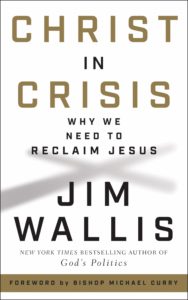 The last one (which came out in 2019) was a fabulous title that we highlighted here. Called Christ in Crisis? Reclaiming Jesus in a Time of Fear, Hate, and Violence it was about Jesus and how Jesus’s teachings were missed or misused in the political debate. It developed themes from the 2018 “Reclaiming Jesus” declaration, and was necessarily a bit more Biblical / theological than some of his titles. Granted, for obvious reasons, he hits harder at the political and cultural right with their pull-yourself-up-by-your-bootstraps / free market ideologies and endless loyalty to an harsh prison system and carelessness about (if not out and out resistance to) Biblical issues such as hospitality for the stranger, compassion for the hungry, and concern for the Earth. When the religious right blesses that sort of distorted and idolatrous political economy with their own brand of un-Christ-like flags and guns and patriotic piety, we should all see how damaging it is to authentic faith. Christ in Crisis? named all that. A refrain throughout the book was “Don’t go right, don’t go left; go deeper.” It invited us to return to the Jesus of the gospels and not allow him to be aligned with movements that were anything but Jesusy and the long preface in the second (paperback) edition written after the election of Donald Trump, during the start of the pandemic and the murder of George Floyd, is powerful, and, again, points us to “what a focus on Jesus can do for us, even in the direst times.”
The last one (which came out in 2019) was a fabulous title that we highlighted here. Called Christ in Crisis? Reclaiming Jesus in a Time of Fear, Hate, and Violence it was about Jesus and how Jesus’s teachings were missed or misused in the political debate. It developed themes from the 2018 “Reclaiming Jesus” declaration, and was necessarily a bit more Biblical / theological than some of his titles. Granted, for obvious reasons, he hits harder at the political and cultural right with their pull-yourself-up-by-your-bootstraps / free market ideologies and endless loyalty to an harsh prison system and carelessness about (if not out and out resistance to) Biblical issues such as hospitality for the stranger, compassion for the hungry, and concern for the Earth. When the religious right blesses that sort of distorted and idolatrous political economy with their own brand of un-Christ-like flags and guns and patriotic piety, we should all see how damaging it is to authentic faith. Christ in Crisis? named all that. A refrain throughout the book was “Don’t go right, don’t go left; go deeper.” It invited us to return to the Jesus of the gospels and not allow him to be aligned with movements that were anything but Jesusy and the long preface in the second (paperback) edition written after the election of Donald Trump, during the start of the pandemic and the murder of George Floyd, is powerful, and, again, points us to “what a focus on Jesus can do for us, even in the direst times.”
Now, Wallis comes with an even harder-hitting, seriously passionate overview of much of his life’s mission, and he developed the heart of the book around six key Biblical texts. Again, he resists the secular left and the religious right, and invites us to a truly Christian perspective, rooted in Scripture. No, it isn’t primarily an exegetical commentary, but he takes inspiration and much solid wisdom from these classic texts and shows their potential political implications. He invites others of various faiths (and of no faith) to grapple with the values inherent in these texts and he asks us to carry them into the public square with vigor.
Again, agree or not with all of his conclusions, it is hard to argue with the methodology, teasing out real-life social and political ramifications of key passages from the Bible.
Allow me to say this: there are other books that explore the details of the overstated sort of nationalism that has been discussed, everywhere, lately, and Jim’s book is not mostly a scholarly account of the rise of that sort of idolatry. He’s a preacher and an activist and storyteller and he nicely mobilizes folks — including young adults (he speaks often of his class at Georgetown) including those with no apparent faith — to better citizenship and civic involvement and public life. He obviously knows many of the best scholars about white nationalism (and has had them on his podcast, “The Soul of the Nation with Jim Wallis”) but it isn’t that kind of an academic treatise.
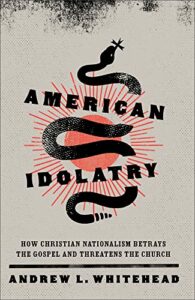
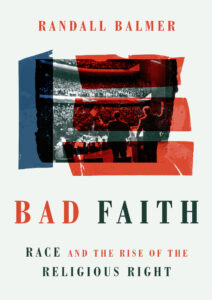 For more rigorous historical depth to our analysis of where this trouble came from, see, just for instance, the updated Taking America Back for God: Christian Nationalism in the United States by Andrew Whitehead & Samuel Perry (Oxford University Press) or American Idolatry: How Christian Nationalism Betrays the Gospel and Threatens the Church by Andrew Whitehead (Brazos Press) or Defending Democracy from Its Christian Enemies by David Gushee (Eerdmans.)
For more rigorous historical depth to our analysis of where this trouble came from, see, just for instance, the updated Taking America Back for God: Christian Nationalism in the United States by Andrew Whitehead & Samuel Perry (Oxford University Press) or American Idolatry: How Christian Nationalism Betrays the Gospel and Threatens the Church by Andrew Whitehead (Brazos Press) or Defending Democracy from Its Christian Enemies by David Gushee (Eerdmans.)
It is not all that needs to be said, but the short Bad Faith: Race and the Rise of the Religious Right by Randall Balmer (Eerdmans) is vital, documenting how racial prejudice was one of the motivating forces with the rise of what was once called the religious right.
 For more recent coverage, you simply must get the excellent The Kingdom, the Power and the Glory: American Evangelicals in an Age of Extremism by reporter Tim Alberta (Harper.) Jim Wallis’s new book is a great introduction to this urgent topic (but you will then want to go deeper with at least one of the above.) Or, if you’ve read some of this historical background with Biblical discernment and you now wonder what to do to bring our Republic back to sensible and just ways, and our churches away from this false gospel orientation, then you will want to read Wallis immediately.
For more recent coverage, you simply must get the excellent The Kingdom, the Power and the Glory: American Evangelicals in an Age of Extremism by reporter Tim Alberta (Harper.) Jim Wallis’s new book is a great introduction to this urgent topic (but you will then want to go deeper with at least one of the above.) Or, if you’ve read some of this historical background with Biblical discernment and you now wonder what to do to bring our Republic back to sensible and just ways, and our churches away from this false gospel orientation, then you will want to read Wallis immediately.
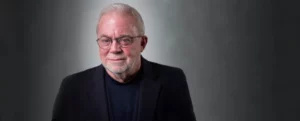 Jim Wallis has a way of telling stories about pretty remarkable stuff from his experiences with pretty ordinary folk — a poor woman in his neighborhood who prayed so very well in their neighborhood food line, a couple of stories about the beloved youth baseball team that he coached for so many years, a dramatic arrest while taking a (nonviolent principled) stand in Congress, a lesson learned while chatting with pastor’s wife who put her foot down during unkind prayers after choir practice, a single mom he observed at Burger King, his meetings with Crips and Bloods gang members, his Zoom meetings helping train poll chaplains and lawyers willing to stand guard against voting rights repression, his young friend who lost his job at a Christian college due to his advocating for public justice and is happy to now be serving the homeless.
Jim Wallis has a way of telling stories about pretty remarkable stuff from his experiences with pretty ordinary folk — a poor woman in his neighborhood who prayed so very well in their neighborhood food line, a couple of stories about the beloved youth baseball team that he coached for so many years, a dramatic arrest while taking a (nonviolent principled) stand in Congress, a lesson learned while chatting with pastor’s wife who put her foot down during unkind prayers after choir practice, a single mom he observed at Burger King, his meetings with Crips and Bloods gang members, his Zoom meetings helping train poll chaplains and lawyers willing to stand guard against voting rights repression, his young friend who lost his job at a Christian college due to his advocating for public justice and is happy to now be serving the homeless.
And, sometimes, he tells of somebody famous he met, and it is inspiring (without at all feeling like name-dropping or bragging.) He was friends with Dorothy Day. He knew Desmond Tutu, he has the privilege of telling stories from his pal Bryan Stephenson, he tells about the faith and courage of Raphael Warnock; his old friend Barbara Williams-Skinner once met the civil rights leader Fannie Lou Hamer, and he tells of meeting Dr. Ray Guerrero, the sole pediatrician at Uvalde, Texas, who joined Wallis on the White House lawn in a coalition working against assault weapons.
Of course he’s on a first name basis with Bono. And, yes, with George W. Bush.
If you’ve never heard Jim’s story about Campus Crusade founder Bill Bright— who threatened him boldly when Sojourner’s was first breaking the story of the big money and creepy power behind what became the Moral Majority and the religious right — and the remarkable reconciliation that happened between the two of them before Bright died, you’ve got to read it.
Despite years and years of enacting public theology — some learned from the likes of radical protestors like Daniel Berrigan, but, it seems, more learned from civic educators like Catholic intellectual Jack Carr or evangelical Michael Gerson or legislatures like John Lewis or social organizers from CCDA — two things, at least, are clear, again, in the story and work of Jim Wallis.
First, he was raised strictly evangelical, Biblically conservative, and when he went to seminary and helped with famous documents like 1973 “The Chicago Declaration” he helped exemplify what in those years were called “the new evangelicals” or the “young evangelicals.” He influenced (and was influenced by) Fuller Seminary’s William Pannell, the colorful preaching of Tony Campolo, the studious Bible teaching of Ron Sider, and the community development models of John Perkins. It is unclear if he really identified fully with evangelicalism — he’s delightfully ecumenical and was equally influenced by Episcopalian lawyer William Stringfellow and mainline preacher William Sloan Coffin, say — but when he starts talking about altar calls and prayer meetings and picking up your cross to follow Jesus, and highlighting Charles Finney and revivalism, you know he has deep roots in that particular tradition of American religion.
But more, as a teen and young adult he left his faith and certainly the evangelical church for a season, the one his parents helped lead, and moved in with a black family, getting a job with blue collar workers. On the inner city streets of late ‘60s Detroit he developed a relationship with — a life-long relationship with — the historic black church. He has said it before, but he is as tender and earnest here as he ever has been about the black church being his spiritual home. From black preachers and scholars like The Reverend Otis Moss III to Episcopal priest, Kelly Brown Douglas to Bishop Vashti McKenzie (and Edie Glaude who wrote the forward) Wallis knows this community and is committed to learning from and with them. He knows about the slave Bibles, the role of the spirituals, about hush arbors; his telling of all that, citing the likes of Frederick Douglas, subtly and humbly, is, again, worth the price of the book.
There are a few telling moments that those of us who have followed his work for decades might recall: oooh, how I shivered when he told the story (familiar to our family) of his getting a call from the evangelical Nicaraguan doctor, Dr. Gustavo Paragon, who said God told him to call a group at a retreat center in Pennsylvania, to tell them to start a resistance movement against the Reagan administration’s possible plans to invade that country. Those Pledge of Resistance cards and promises to do civil disobedience at congressional offices all over the country should we invade — according to Congressional aids that were in the rooms — helped dissuade the administration from a full-on invasion. (We were less successful in stopping the contras’ bloody attacks, funded illegally by Falwell and Ollie North and other corrupt Christian nationalists, although the nonviolent service of the Witness for Peace movement was part of the legacy of those years, too.)
Which is what makes The False White Gospel so very valuable; Wallis isn’t just jumping on a bandwagon, responding to a fad by yelping about nationalism, now, as if it is a new thing. He has been at this personally for more than 50 years! The book does do what needs to be done informing us about the history of the co-mingling of fundamentalist faith and extremist, far-right politics, especially in recent years. It warns about Trump and his MAGA movement in no uncertain terms and it is unsettling. Has the ugliness of far-right misinformation ever been so weirdly entwined with Christian lingo? Is it overstated to worry about fascism and authoritarian totalitarianism?
The False White Gospel shows powerfully the influences of race and racism in that tragic history of nationalism, white, so-called Christian nationalism. And he gets in the weeds of cultural habits and political policies. His pages on racist gerrymandering and voter repression and such should concern, and motivate, citizens of any political stripe, it would seem to me. Those who think the Republican Party is racially benign simply have to read this! He explains the data from books like The New Jim Crow or The Sum of Us or Just Mercy and frames it as the sort of brokenness that only the gospel can overcome. For the good of our land, for the good of ourselves and our neighbors, we have to resist the false (white) gospel of bondage and embrace the gospel of Jesus. That much, at least, is that simple.
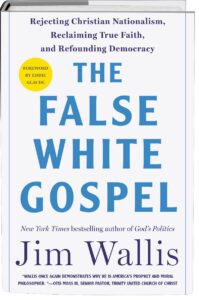 But the book isn’t just a critique of racism (heck, he did that in old Sojo studies decades ago, speaking out consistently while on the road with John Perkins or Lisa Sharon Harper or Vincent Harding or Catherine Meeks or Cornel West, and decisively in America’s Original Sin: Racism, White Privilege, and the Bridge to a New America, published by Brazos Press in 2016.) Rather, this new book is hoping to invite a conversation about “a remnant church” which can help offer principles and spirit to rebuild our frayed Republic, and shore up our best democratic impulses in a multi-racial and multi-faith context. Yep, he even nicely cites Abraham Lincoln. And, perhaps drawing on the gentle, wise, Parker Palmer, he invites us to find common ground and engage in honest dialogues — informally in the work world, neighborhood, or church, or in more structured ways. There’s even a guide in the back for civic minded circles that could foster hard conversations about the things that matter most for the sake of the Republic.
But the book isn’t just a critique of racism (heck, he did that in old Sojo studies decades ago, speaking out consistently while on the road with John Perkins or Lisa Sharon Harper or Vincent Harding or Catherine Meeks or Cornel West, and decisively in America’s Original Sin: Racism, White Privilege, and the Bridge to a New America, published by Brazos Press in 2016.) Rather, this new book is hoping to invite a conversation about “a remnant church” which can help offer principles and spirit to rebuild our frayed Republic, and shore up our best democratic impulses in a multi-racial and multi-faith context. Yep, he even nicely cites Abraham Lincoln. And, perhaps drawing on the gentle, wise, Parker Palmer, he invites us to find common ground and engage in honest dialogues — informally in the work world, neighborhood, or church, or in more structured ways. There’s even a guide in the back for civic minded circles that could foster hard conversations about the things that matter most for the sake of the Republic.
The heart of the book looks at six key Biblical texts, texts that serve sort of as touchstones for this manifesto for our movement. At one point I think he calls them iconic.
He looks at and fleshes out the public implications of these classic passages:
- Luke 10: 25-37
- Genesis 1:26
- John 8:32
- Matthew 25: 31-46
- Matthew 5:9
- Galatians 3:28
Perhaps because he spent some time as a pastor and partially because he knows how strategic pastors are in mobilizing Spirit-empower folks who are sent into the public square, he has a page of idea for pastors who might want to use the book, offering some advice about preaching and teaching and nurturing what he calls civic discipleship.
Civic discipleship. Not bad, eh? Truly and wisely shaped by Scripture, that is the alternative to the false white gospel.
Once we understand the way the MAGA movement with its lies and aggression and all manner of complicity have co-opted the gospel itself, what do we do?
Insightful books analyzing White Christian Nationalism have been appearing. But Jim Wallis asks the next crucial question — what does this mean for the church? His prophetic answer should galvanize our attention: a calls for a ‘Remnant Church,’ shaped by repentance, return, and restoration. Beyond analysis, this book provides clear answers which offer the hope of real transformation. — Wesley Granberg-Michaelson, General Secretary Emeritus, Reformed Church in America; author of Without Oars: Casting Off into a Life of Pilgrimage and Future Faith: Ten Challenges Reshaping Christianity in the 21st Century
Jim Wallis is a national treasure. In this powerful new book, he focuses our attention on the pernicious problem of American racism, but more importantly he inspires us to never give up hope on the great promise of American pluralism. — Eboo Patel, President of Interfaith America; author of We Need To Build
For more than fifty years, Jim Wallis has been calling on his fellow white evangelicals to live up to the teachings at the heart of their shared faith: loving their neighbors, doing justice, and pursuing peace. With American democracy hanging in the balance, Wallis’s message has never been more urgent. Without shying away from hard truths, The False White Gospel draws on Christianity itself to point the way forward to a multiracial democracy in which people of all faiths can flourish. — Kristin Kobes Du Mez, author of Jesus and John Wayne: How White Evangelicals Corrupted a Faith and Fractured a Nation
FIVE MORE BOOKS TO HELP YOU CARRY ON — WHAT TO DO NEXT
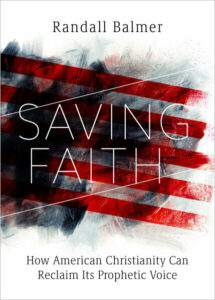 Saving Faith: How American Christianity Can Reclaim It’s Prophetic Voice Randall Balmer (Fortress) $18.00 OUR SALE PRICE = $14.40
Saving Faith: How American Christianity Can Reclaim It’s Prophetic Voice Randall Balmer (Fortress) $18.00 OUR SALE PRICE = $14.40
I mentioned above, in passing, the short little book Bad Faith by historian Randall Balmer which is well worth reading. This newer one, Saving Faith — what a great play on words! — is his reminder that “any attempt to arrest the decline of Christianity in American must first reckon with its past, especially America’s ‘original sin’ of racism.” I think he is right. E.J. Dionne has called him “one of our most discerning scholars about religion, one of the most passionate voices within his tradition, and one great storyteller.”
This is well researched and clear-eyed, although he grew up clearly in the evangelical subculture and he continues on in his dedicated Christian faith, so there is warmth and care, even though it can feel a bit stinging at times. Short and solid.
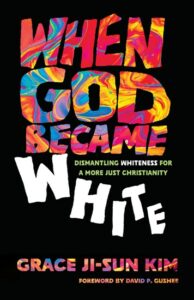 When God Became White: Dismantling Whiteness for A More Just Christianity Grace Ji-Sun Kim (IVP) $18.00 OUR SALE PRICE = $14.40
When God Became White: Dismantling Whiteness for A More Just Christianity Grace Ji-Sun Kim (IVP) $18.00 OUR SALE PRICE = $14.40
This just arrived, a bit early, and I haven’t studied it yet. I admire Grace Ji-Sun Kim a lot — her podcast (Mandang) is very impressive and widely respected. She has written a lot (and is, by the way, ordained as a PC(USA) pastor) most well-known, perhaps, Healing Our Broken Humanity. Although her PhD is from the University of Toronto and she teaches at Earlham (in Indiana) she resides in Pennsylvania. Hooray.
Look: when Christianity became Western, God seemed to become white. This ought not be a controversial claim but other such books exploring this oddity were viewed with suspicion by some (mostly white folks.) Why? It almost proves the point that we desperately need a book like this.
Christianity is rooted in the ancient Near East. We’re getting that, finally, in children’s Bibles showing Biblical characters and Jesus in ways that are historically accurate, and not as Europeans. But, still, we need a corrective to this view, and that which too often comes along with it — the myth of a white male God and a colonialist worldview. These views and postures, she will claim, have been harmful around the globe and we simply have to dismantle much of that.
We need to, as it says on the back, “recover a biblical reality of a nonwhite, non-gendered God.” As one reviewer put it, this is a “liberating expose,” Kudos to IVP for helping us disentangle authentic faith from this white male power stuff, that only reinforces and authorizes white Christian nationalism. This looks really good.
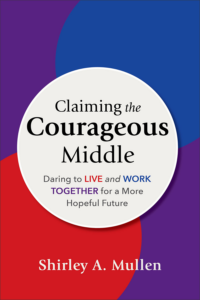 Claiming the Courageous Middle: Daring to Live and Work Together for a More Hopeful Further Shirley A. Mullen (Baker Academic) $26.99 OUR SALE PRICE = $21.59
Claiming the Courageous Middle: Daring to Live and Work Together for a More Hopeful Further Shirley A. Mullen (Baker Academic) $26.99 OUR SALE PRICE = $21.59
Wow, I’ve long admired Dr. Mullen — former president of Houghton College in New York state — and her long-respected work in faith-based higher education; I know she nurtured students (and faculty) as President to be more deeply sensitive to multi-ethnic concerns, to an evangelical spirit of inclusion and care, and for a wise and courage sort of balance that often doesn’t get as much press as do the more dramatic calls from the extremes. Can one be prophetic from the center? What sort of habits of mind and heart and what sorts of virtues of courage are needed to come down on a prolonged, consistently thought out view that might be called an alternative to polarization?
Claiming the Courageous Middle came just a day ago — hooray! — so I don’t even know what all she may mean by this call to the courageous middle. I am sure it is not side-stepping deep Biblical mandates about justice or racial equity. It certainly is not a nice way of saying we need not engage in public matters and dare not be prophetic. I’m supposing that it will be a powerful call to be, indeed, Biblically prophetic by denouncing extreme ideologies of all sorts and of working for common ground, including the often excluded.
Dr. Mullen is a cultural historian (perhaps somewhat in the mold of Robert Putnam; I know she cites American Grace) and has been an evangelical mentor to many, so I am sure there is both serious social analysis and good, heart-warming stories. I like how committed this book seems to be for the principle of unity — what some call building the “beloved community” — or at least working towards something akin to it. Believe me, I appreciate how painful it can be to be misunderstood by “both” sides and to nonetheless try to be cruciform, somehow, arms outstretched to all. It’s hard.
I suspect this just might be a good book to read after the Wallis volume. It is what one scholar calls “a book of hope in the midst of despair.” Kudos to Baker Academic publishing for this.
I like how Walter Kim (of the National Association of Evangelicals) put it:
Mullen calls us to live and lead from the courageous middle — not a place of muddled thought and squishy compromise but of curiosity, humility, love for Jesus and others, and a confidence that God is not daunted by our moment.
John Inazu (whose fantastically delightful and exceptionally profound book, Learning to Disagree: The Surprising Path to Navigating Differences with Empathy and Respect, I mentioned last week, and describe again, below, endorses it as “important” by saying this:
Mullen brings a lifetime of wisdom and experience to this meditation on the courageous middle. An important book full of resources, ideas, and practical steps for Christians seeking to faithfully navigate the deep differences in our society. — John Inazu, Sally Danforth Distinguished Professor of Law and Religion at Washington University, St. Louis
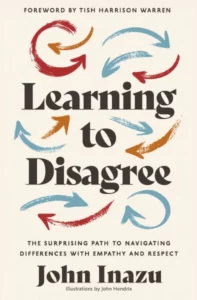 Learning to Disagree: The Surprising Path to Navigating Differences with Empathy and Respect John Inazu (Zondervan) $27.99 OUR SALE PRICE = $22.39
Learning to Disagree: The Surprising Path to Navigating Differences with Empathy and Respect John Inazu (Zondervan) $27.99 OUR SALE PRICE = $22.39
I celebrated this great, fun, wise, new book in last week’s BookNotes, noting that this notion of “learning to disagree” and moving towards a confident sort of pluralism was a mark of resurrection life in our broken, polarized culture. I firmly believe that, and this book is so profoundly wise (even if deceptively simple) I wanted to give another brief recommendation here, now. I loved this book!
I do not know if John Inazu — a distinguished scholar of law and religion at a mainstream, secular law school — would agree fully with Jim Wallis’s work, above. As an American of Japanese descent (and a decent, thoughtful human, and a justice-seeking Christian) he knows a bit about racial injustice. There is an very understated but moving story in a chapter on forgiveness in Learning to Disagree of his trip to the internment camp his grandparents and other relatives were forced into in the 1940. (His grandfather respectfully pursued meetings about the affront to his U.S. citizenship that this forced relocation and captivity caused, and they were punished for that as well.) After some local medical folks helped care for a two-year old son (John’s uncle, I think) his grandmother put an add in the local paper thanking the medical team for their kindness and care; it seems she was a good woman, but she learned to forgive (helped along when President Reagan offered a full apology on behalf of the government.) It’s a moving chapter, but, like I say, it is casually told and nearly understated.
John is a law school professor and this book is written as a memoir, a report of a year of his life, the classes he taught, the students he guided, the campus politics (some quite tense with protesting students — you can imagine.) There are coffee shop conversations and golf games and flights to speaking engagements and comments about his home life. Mostly, he walks us through a few key classes and the main things he invites students to grapple with, always with a tone of wanting them to understanding the complexity of the law and the ways in which lawyers debate about the best interpretation and application of precedent and legal rulings. This is a beautiful example of hearing of a Christian professor telling how he lives out his calling and we get to learn much — about the content of law and the stuff taught in some law school classes, yes, but more about his formational role in deepening the empathy of his students and the graciousness with which they do or do not move into the world of complexity and polarization.
And it is just a delight to read; charming, even.
As Tish Harrison Warren writes in her excellent foreword, John “wades into the complexity of divergent ideologies he encounters eery day in his classroom and work and graciously invites us to have a front-row seat.” In this way, it is a “field guide” to understanding the limits of our own knowledge and move towards a healthier culture.
I love his self-effacing stories, his humor, his honesty. He is clearly a Christian, even in his theoretical framework for his approach to law and religion and culture and the meaning of justice, but there is little direct Bible stuff here. I’m glad for this kind of a “Christian book” that could easily be shared with any reader who cares about building a better world. His gentle reminders about learning to care and make room for others and disagree well, framed as they are by his stories of being a legal scholar and prof, and a dad and a church member and a friend and colleague, really makes this book shine.
Tish Warren jokingly notes how her pal John sometimes pops her bubbles of self-righteous zeal and indignation when she calls him to rail about this or that. He is a wise voice of moderation and grace, with a deep knowledge of legal opinions and precedents, and she respects that so much. She knows how tense it can be out there. And she knows that to be agents of God’s reconciliation means we have to learn better how to navigate our differences, not just rant about them.
She writes:
We can’t merely think our way to a better, healthier society — a society in which we know how to disagree well. Embracing convictions with both confidence and humility is a skill and a habit, a way of being that is practiced and grows over time. Learning to be a good neighbor, friend and coworker across deep differences is more often like learning to walk than learning a creed. It is an embodied art of relating to others and the world around us…. It is a practice, a craft, a dance, a vibe, a mode of living. We therefore must learn to practice civic virtues in our own contexts and our daily lives.
And then she extols John’s storytelling and the “granularity” of the relationships and conversations he writes about, explaining how they can help us. Inazu shows how healthy disagreement is not only possible, she says, but is, in fact, “the very path of wisdom, virtue, and love.”
She notes, in Learning to Disagree,
…John doesn’t just tell us that a convicted and kind pluralism is vital to the health of society; he brings us into the ordinary and mundane rhythms of his life as a legal scholar, a public thinker, a professor, a dad, a friends, a coworker, a church member, and a neighbor.
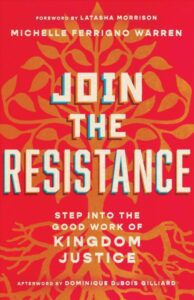 Join the Resistance: Step into the Good Work of Kingdom Justice Michelle Ferrigno Warren (IVP) $18.00 OUR SALE PRICE = $14.40
Join the Resistance: Step into the Good Work of Kingdom Justice Michelle Ferrigno Warren (IVP) $18.00 OUR SALE PRICE = $14.40
Wow — this is a stunner of a book, well-written, exciting, visionary, hopeful about (and maybe helping widen) an awakening, an awakening that she says has been happening all over. As Wallis poured his life out for decades, and as the grass-roots activists and coalition builders and networkers he highlights illustrate, faith-based justice work has been a major part of the religious landscape for decades (and, historically, longer than than.) The vibrant sort of new leaders of the 21st century look like Michelle Ferrigno Warren — the CEO of Virago Strategies, a consulting group that provides strategic direction and project management for civic engagement campaigns. Who knew there was such a thing?? She has been in the middle of all kinds of stuff — she helped found Open Door Ministers in downtown Denver, which addressed poverty, addictions, and homelessness.
You may know her from the fabulous, passionate, and compelling book called The Power of Proximity. (It is a phrase Wallis uses, I think — no doubt because he knows her work!)
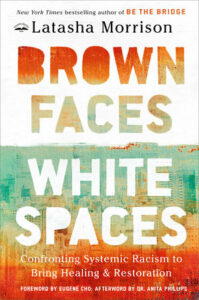 And the forward to this thrilling guidebook is by the great Latasha Morrison, who wrote the 2019 best-seller, Be the Bridge: Pursuing God’s Heart for Racial Reconciliation. (By the way, in mid-May 2024 her long-awaited second book is coming in hardback, Brown Faces, White Spaces: Confronting Systemic Racism to Bring Healing and Restoration – Waterbrook; $27.00. OUR SALE PRICE WILL BE $21.60. You can pre-order it now at our BookNotes 20% off and we’ll put you on the waiting list, sending it in May.) She is a powerful force herself and it is fabulous to see her lovely introductory pages, complimenting her sister Michelle Warren.
And the forward to this thrilling guidebook is by the great Latasha Morrison, who wrote the 2019 best-seller, Be the Bridge: Pursuing God’s Heart for Racial Reconciliation. (By the way, in mid-May 2024 her long-awaited second book is coming in hardback, Brown Faces, White Spaces: Confronting Systemic Racism to Bring Healing and Restoration – Waterbrook; $27.00. OUR SALE PRICE WILL BE $21.60. You can pre-order it now at our BookNotes 20% off and we’ll put you on the waiting list, sending it in May.) She is a powerful force herself and it is fabulous to see her lovely introductory pages, complimenting her sister Michelle Warren.
So many people we admire give a hats off to Michelle — Lisa Sharon Harper says it is “full of relevant stories and practical tips — well-earned by hears of faith-rooted resistance and action.” Karen Gonzalez (Beyond Welcome) says “When Michelle speaks, I listen, because she embodies Christ’s command to love and serve those on the margins.” Robert Chao Romeo (author of Brown Church) says it is “an important guide”
I enjoy the blurb from Kristine Vaillancourt Murphy, the executive director of Catholic Mobilizing Network who says it,
Offers heartening lived experiences and inspiring faith lessons that will surely encourage both seasons advocates and newcomers to the work of social justice.
Kikki Toyama-Szeto, the executive director of Christians for Social Action, puts it nicely:
Join the Resistance is an opportunity to take a master class with a seasoned savvy leader.
This master class is something all of us can use (especially after being informed and inspired by the types of books mentioned above.) She talks about “stepping into the good work” and the first three chapters about “serving the movement” and she inspires bravery and more. Wow. The middle part is about that long arc and is an invitation to “stay at the table.” She has a great chapter on resilience and insight about “leveraging what you have.” It all rings very true to me but also seemed fresh and vital. You will be glad you read it. The third section (“Help Your People”) is about being rooted in peace, in love, and in joy. Not bad, huh?
The afterword is by Dominique DuBois Gilliard, a leading black author and head of justice ministries in the Evangelical Congregational denomination. He ends the book well with some Biblical reflections and a reminder of marching orders we get from Scripture to be “ambassadors of reconciliation and repairers of the breach.” Amen!
+++
TO PLACE AN ORDER
PLEASE READ, THEN SCROLL DOWN AND CLICK ON THE “ORDER HERE” LINK BELOW.
It is helpful if you tell us how you want us to ship your orders.And if you are doing a pre-order, tell us if you want us to hold other books until the pre-order comes, or send some now, and others later… we’re eager to serve you in a way that you prefer. Let us know your hopes.
The weight and destination of your package varies but you can use this as a quick, general guide:
There are generally two kinds of US Mail options and, of course, UPS. If necessary, we can do overnight and other expedited methods, too. Just ask.
- United States Postal Service has the option called “Media Mail” which is cheapest but can be a little slower. For one typical book, usually, it’s $4.33; 2 lbs would be $5.07. This is the cheapest method available and seems not to be too delayed.
- United States Postal Service has another, quicker option called “Priority Mail” which is $8.70, if it fits in a flat-rate envelope. Many children’s books and some Bibles are oversized so that might take the next size up which is $9.50. “Priority Mail” gets much more attention than does “Media Mail” and is often just a few days to anywhere in the US.
- UPS Ground is reliable but varies by weight and distance and may take longer than USPS. Sometimes they are cheaper than Priority. We’re happy to figure out your options for you once we know what you want.
If you just want to say “cheapest” that is fine. If you are eager and don’t want the slowest method, do say so. It really helps us serve you well so let us know. Keep in mind the possibility of holiday supply chain issues and slower delivery… still, we’re excited to serve you.
BookNotes
SPECIAL
DISCOUNT
20% OFF
ALL BOOKS MENTIONED
+++
order here
this takes you to the secure Hearts & Minds order form page
just tell us what you want to order
inquire here
if you have questions or need more information
just ask us what you want to know
Hearts & Minds 234 East Main Street Dallastown PA 17313
read@heartsandmindsbooks.com
717-246-3333
Sadly, as of April 2024 we are still closed for in-store browsing. COVID is not fully over. Since few are reporting their illnesses anymore, it is tricky to know the reality but the best measurement is to check the waste water tables to see the amount of virus in the eco-system. It isn’t good. It is important to be aware of how risks we take might effect the public good — those at risk, while not dying from the virus, are experiencing long-term health consequences. (Just check the latest reports of the rise of heart attacks and diabetes among younger adults, caused by long Covid.) It is complicated, but we are still closed for in-store browsing due to our commitment to public health (and the safety of our family who live here, our staff, and customers.) Our store is a bit cramped without top-notch ventilation, so we are trying to be wise. Thanks very much for understanding.
We will keep you posted about our future plans… we are eager to reopen. Pray for us.
We are doing our curb-side and back yard customer service and can show any number of items to you if you call us from our back parking lot. It’s sort of fun, actually. We are eager to serve and grateful for your patience as we all work to mitigate the pandemic. We are very happy to help, so if you are in the area, do stop by. We love to see friends and customers.
We are happy to ship books anywhere.
We are here 10:00 – 6:00 EST / Monday – Saturday. Closed on Sunday.

